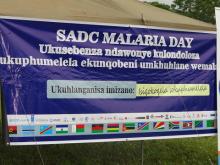Zimbabwe hosts SADC Malaria Day
Vic. Falls, 16 Jan. 2015 Zimbabwe, which is the Chairperson for Ministers of Health in the SADC Region played host to the belated regional commemoration of SADC Malaria Day in Victoria Falls. The commemoration which brought together SADC Ministers of Health, Roll Back Malaria (RBM) partners, and the Victoria Falls community, was held under the theme “Strong partnerships sustain gains in malaria prevention and control” and the slogan, “Combining efforts—key to success”.
Speakers at the commemoration all spoke about the importance of combining efforts as a key to success as the region moves towards malaria elimination. In his statement, the Minister of Health and Child Care, who is also the Chairperson of the SADC Ministers of Health, Dr David Parirenyatwa, acknowledged the strong partnerships with corporates, UN Agencies, RBM, among others and said it is these strong partnerships that have made the achievements over the years possible. “These partnerships will obviously be crucial for us to sustain our gains in malaria control and prevention going forward,” he said.
He also acknowledged that SADC member states have made great strides in decreasing the morbidity and mortality due to malaria, with some countries moving towards malaria elimination. “This is a remarkable achievement as move towards the end of 2015 when we are all required to report on the attainment of the Millennium Development Goals (MDGs) and the Global Malaria Action Plan set targets and milestones, “ said Dr Parirenyatwa.
In a statement read on behalf of the Regional Director, Dr Luis Gomez Sambo, by the WHO Representative for Zimbabwe, Dr David Okello, the same sentiments were shared. He acknowledged the efforts by countries moving towards malaria elimination to combine efforts from the various players.
He, however, urged countries that are moving towards elimination not to reduce investment in malaria as this would be risky as it would expose countries to a major rebound of malaria, with subsequent loss of all the gains made. “We have already witnessed this phenomenon in other regions; and we must not allow it to happen in the SADC region,” he said. He also hailed the cross-border collaboration among SADC countries whose main purpose is to deliver coordinated, harmonised and synchronised malaria control and elimination interventions. He urged governments and partners in malaria control to invest more in cross border collaboration because porous borders make control of movement of populations very difficult.
On the DDT debate, Dr Okello said, “ When administered in line with the strict international guidance for indoor residual spraying for malaria vector control, DDT works very effectively and has drastically brought down the burden of malaria in SADC countries”. He, however, urged countries to be vigilant in monitoring for the development of vector resistance to the insecticide, and pledged WHO’s technical support and brokering of partnerships and resource mobilisation in support of malaria control programs.


